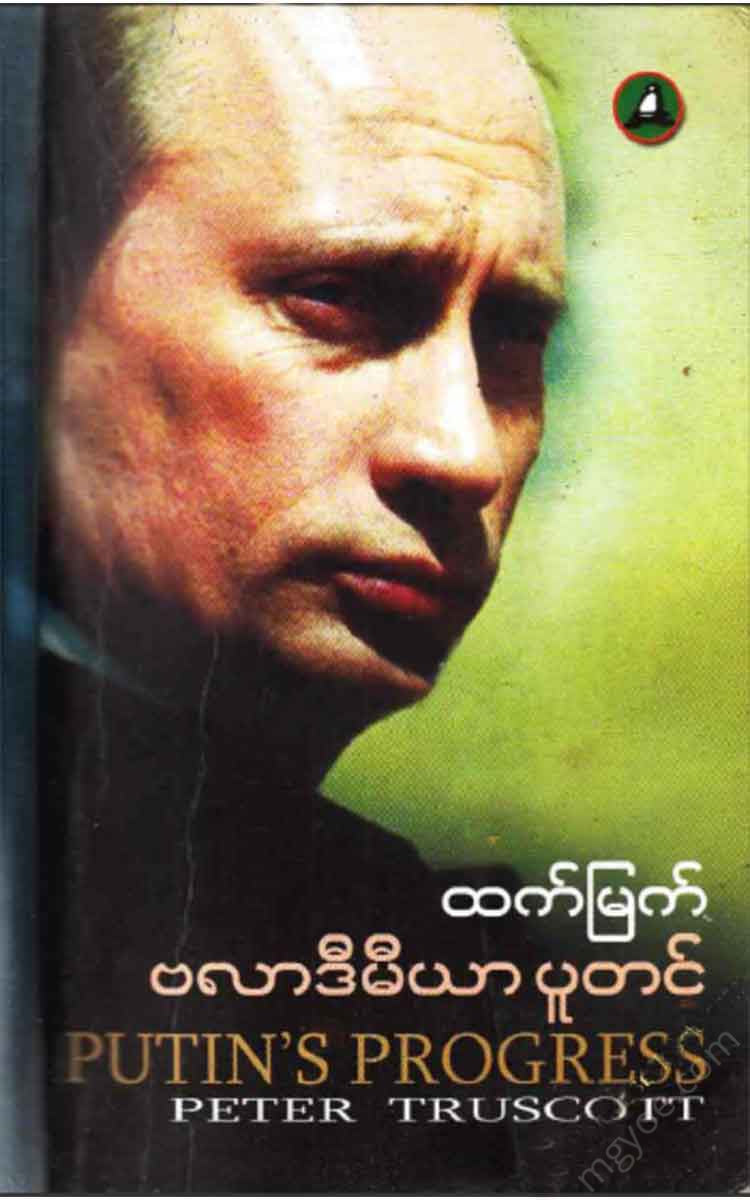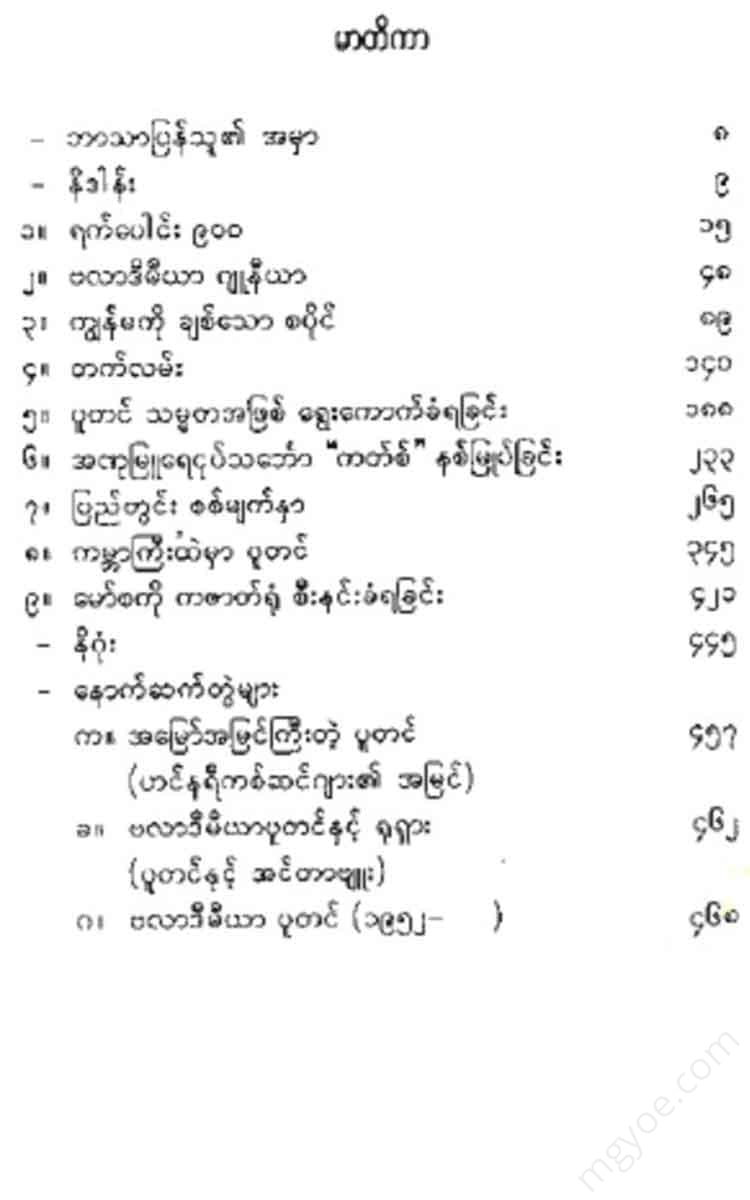Other Websites
Brilliant - Vladimir Putin
Brilliant - Vladimir Putin
Couldn't load pickup availability
Translator's note
I must say that I started my literary journey with biographies. First, after Nguyen Van Tri, I wrote the lyrics of Ou Yang Hai.
Now I want to translate Vladimir Putin, so I asked Ko Ukka Aye from Alankarvuttyi Bookstore, and he bought it from Singapore.
Vladimir Putin was written about in the journal Alankavuttyi | Weekly and then stopped writing. Now
I finished writing Vladimir Putin while chatting with U Soe Nyunt at the Yapye Bookstore.
Therefore, I would like to express my sincere gratitude to Ko Ukka Aye for bringing me Peter Truscott's book Putin's Progress, and I would also like to express my special gratitude to U Soe Nyunt from Yapye Bookstore for publishing the book.
Smart
Vladimir Putin (1952 - )
VLADIMIR PUTIN
Vladimir Putin was born on 7 October 1952 in Leningrad, now known as Saint Petersburg, in the former Soviet Union. He is the second President of the Russian Federation and currently serves as Prime Minister. He is also the Chairman of the United Russia Party, and the Chairman of the Council of Ministers of the Russian Federation and the Republic of Belarus.
He became acting president on December 31, 1999, succeeding the retiring President Boris Yeltsin. He was elected president in the 2000 presidential election. Vladimir Putin was also elected president for a second term in the 2004 presidential election. His term ended on May 7, 2008.
After serving two terms as president, he was appointed prime minister. The Russian public overwhelmingly supports Putin. Putin is pleased with the support of the Russian people. During his eight years as president, he was able to revive the previously collapsed Russian economy and solve Russia's economic crisis. In his second term, Russia's gross domestic product (GDP) increased by six times (75%). Poverty has also been eliminated by more than half. The average monthly income of the population has also increased from $80 to $640.
In other words, it rose by 150%. Despite Putin's achievements, foreign governments and domestic opponents say that Putin has committed human rights abuses. This is especially true for the attack on Chechnya. His opponents are dissatisfied with his close relations with former Soviet republics and his close ties with Russian oligarchs. These opponents have incited anti-Russian sentiment. Businessmen living abroad and Western opponents have attacked Putin. As his second term nears its end, there was speculation that Putin would seek a third term by amending the constitution, as the Russian public overwhelmingly supports him. However, Putin did not run for a third term.
According to the Constitution
He resigned as president and appointed Dmitry Medvedev as president. Medvedev came third in the 2008 presidential election.
He became the President of Russia and appointed Putin as Prime Minister. Putin took office as Prime Minister on May 8, 2008.
Childhood and KGB service
Putin's mother, Maria Ivanovna, was a factory worker. His father, Vladimir Superikhonovich Putin, served in the Soviet Navy. In the early 1930s, his father served in the Soviet submarine corps. During World War II, his father served in the MKVD intelligence service, where he was tasked with secretly disrupting enemy operations. He had two older brothers born in the 1930s. One died within a few months of birth, and the other died during the Nazi siege of Leningrad. His paternal grandfather, Spiridon Putin, served as a chef to Vladimir Lenin and Joseph Stalin.
His autobiography, "First Person," is based on interviews and speeches by Putin. Putin's early life was relatively simple. He describes his childhood as a child, when his family lived in a small room in a crowded building, his childhood dream of becoming an officer in the secret service, and his admiration for the spy actors in Soviet films. Putin graduated from Leningrad State University in 1975. He received a degree in international law from the law faculty. His final thesis was titled "International Law." Putin then joined the KGB (Russian secret service). While at the university, he was a member of the Communist Party of the Soviet Union. He remained a member until the party was dissolved in December 1991. In 1976, Putin completed his training at the KGB's Okhta training school in Leningrad. According to Yuri Fashutin and Vladimir Pribylovsky, Putin was assigned to the Fifth Directorate of the KGB. This department was responsible for the political and security affairs of the Soviet Union.
The Washington Post reported that Putin was tasked with spying on foreigners who had come to Leningrad. He was then promoted to officer and transferred to the Foreign Intelligence Service, which was the first Directorate-General of the KGB. After that, he went through another advanced training course for several years. He entered the school in 1985 and attended the advanced training course at the Dzerzhinsky KCB headquarters in Moscow. At that time, the director of the KCA headquarters was Yuri Andropoulos. (Now called the Institute of Foreign Intelligence.) He then returned to Leningrad and served from 1979 to 1983. From 1985 to 1990, he was the KGB chief in Dresden, East Germany. After the collapse of the East German regime, Putin was recalled. He served in Leningrad. In June 1991, he became a lecturer at the Department of International Affairs at Leningrad University. While teaching at Leningrad State University, Putin became friends with Anatoly Bobrovsky. Bobrovsky would later become the mayor of Leningrad. Bobrovsky was an assistant professor at Leningrad State University when Putin was a student. He was also Putin's mentor. On August 20, 1991, Putin officially resigned from the Department of International Security. At that time, Soviet President Mikhail Gorbachev was reducing the size of the KGB. It is.
Presidential career, first term (2000-2004)
On December 31, 1999, President Boris Yeltsin resigned, and under the Russian constitution, Vladimir Putin became acting president. This was the highest office he had ever held. According to the constitution, if the incumbent president resigns for any reason, he must appoint a person of his choice to act as acting president until the end of his term. He therefore assumed the role of acting president of the Russian Federation. Since Yeltsin had transferred him to acting president, Putin signed into law a law on February 12, 2001, “On the Prohibition of Legal Actions and Charges against Former Presidents and Their Families,” which was approved by the parliament. As a result, Yeltsin and his family were exempt from charges of money laundering. They were indicted by Russian and Swiss authorities for money laundering. A new presidential election is due in 2000.
Wilson stepped down as president and elected Putin as the government's pro-government president. Putin won the presidential election held on March 26, 2000.
On May 7, 2000, Putin was sworn in as president. He appointed his former finance minister, Mikhail Kassym-Jomart, as prime minister. The new government announced its intention to dismantle the top-down system. In May 2000, the Russian Federation was divided into seven federal subjects, which had previously been divided into 89 regions. In July 2000, the Russian parliament formally recognized him as president. As soon as he took office, he began to crack down on the business tycoons who had dominated the Russian government under the Elson regime. He first ordered an investigation into Boris Berezovsky. He also began to crack down on corruption and bribery within the previous government. Putin's first challenge as president was the seizure of the Russian nuclear submarine Kats, Drowned in the Bering Sea.
When Putin became president, he also changed the Russian national anthem. At the time, the change only involved changing the melody, not the lyrics. The melody was recorded by Glinka.
The National Anthem is a Soviet national anthem written by Alexandrov during the Soviet era after 1944. Now
The changed anthem was written by Mit. In 2002, a Moscow theater was seized and the audience was kidnapped by Chechen rebels. The hostage-taking was forced by security forces, resulting in the deaths of 130 hostages. The international media criticized Putin for the incident. However, the Russian public supported Putin in the fiasco theater siege, and Putin was acquitted.
The approval rating rose to 83%. In July 2003, the government arrested Mikhail Kozsky, the majority shareholder of the oil company, and his partner Platon Lebedev.
Ahead of the elections in the country, Putin appointed Sergei Ivanovich as defense minister. Ivanovich is the first civilian to be appointed as defense minister, not a military officer.
Family and private life
Putin married Lyudmila Shekretsova on July 28, 1983. Lyudmila was a student of Spanish at the Faculty of Philosophy of Leningrad University. She had also worked as a flight attendant. She was born on January 6, 1958 in Kaliningrad. The couple had two daughters. The eldest daughter, Marina Putina, nicknamed "Masha", was born in 1985, and the younger daughter, Ekaterina, nicknamed "Katia" Putina, was born in Dresden in 1986. Both daughters studied at a German language school in Moscow. He taught German until he became Prime Minister. Putin also has a black Labrador retriever named "Koni". The dog often accompanies him and often comes to meetings.
Putin has owned a private country house since 1992. It is a 7,000-square-meter country house in Solovki, a suburb of Leningrad. On November 10, 1996, he and his neighbors dug a large pond. The country house was officially his property, and was included in his 2000 presidential election manifesto.
Putin's father was a traditional communist of the Soviet era. He truly believed in communism and practiced it until his death. He was also the secretary of an underground organization that he had been active in since the fascist revolution. He was also active in the factory party committee. Therefore, his father was not religious.
He became an atheist. However, Putin's mother was a devout Orthodox Christian. There were no icons in the house, but she went to church regularly every Sunday. Although the Soviet government did not encourage Orthodox Christianity, his mother was a faithful follower of the religion. Putin's father knew that his wife was religious, but he did not say anything about it. His mother introduced her son to Christianity when he was a child, without his father knowing. Putin has said that he was very religious and that religion had awakened his conscience. In 1993, his wife Lyudmila was seriously injured in a car accident. In August 1996, a large fire broke out in the country house where they lived.
He said that at that time, they were saved by the grace of God. He said that when he arrived in Israel, his mother baptized him, and that he was a Syrian. "When I was little, my mother put a cross around my neck. Since then, I have always worn it." Putin also spoke about his religion during a meeting with Bush in 2001.
Martial arts
In 2005, Putin attended a judo training course in Japan. Putin's favorite sport is judo. Putin began his training in sambo (a traditional Russian martial art in the Soviet Union). He was only 14 at the time. He had not yet played judo. After learning sambo, he has practiced judo with great passion to this day. He became a professional judo player in Leningrad, now St. Petersburg. He won the Leningrad High Judo Championship. He was the chairman of the Rawarado Self-Defense Association. Putin co-authored a book on judo. The book was published in Russia and has become a best-selling book to this day. The book is called “The History, Technique and Practice of Judo.” Another book is “Vladimir Putin and Judo.” Putin’s rank is 6th Dan. (The world is red and white.) When he arrived in Japan, the Kodokan University invited him to show his students how to play judo. | Japanese officials said that his style of play was different from the Japanese style of judo and had different techniques.



